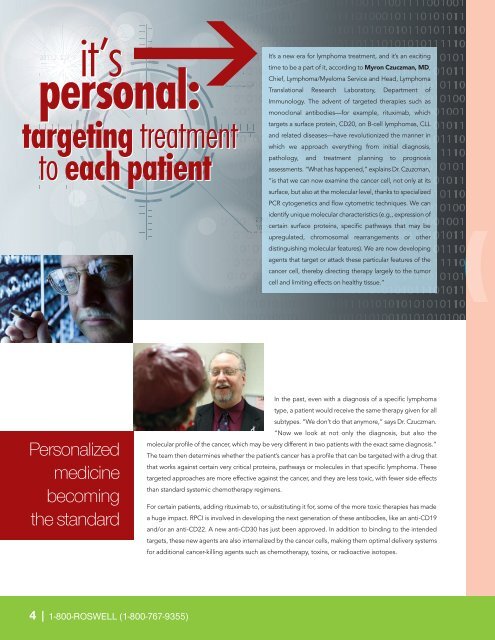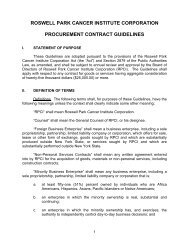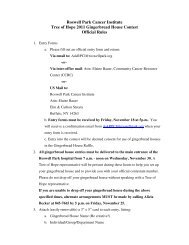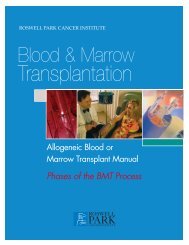Lymphoma and Myeloma Newsletter - Roswell Park Cancer Institute
Lymphoma and Myeloma Newsletter - Roswell Park Cancer Institute
Lymphoma and Myeloma Newsletter - Roswell Park Cancer Institute
Create successful ePaper yourself
Turn your PDF publications into a flip-book with our unique Google optimized e-Paper software.
it’spersonal:targeting treatmentto each patientIt’s a new era for lymphoma treatment, <strong>and</strong> it’s an excitingtime to be a part of it, according to Myron Czuczman, MD,Chief, <strong>Lymphoma</strong>/<strong>Myeloma</strong> Service <strong>and</strong> Head, <strong>Lymphoma</strong>Translational Research Laboratory, Department ofImmunology. The advent of targeted therapies such asmonoclonal antibodies—for example, rituximab, whichtargets a surface protein, CD20, on B-cell lymphomas, CLL<strong>and</strong> related diseases—have revolutionized the manner inwhich we approach everything from initial diagnosis,pathology, <strong>and</strong> treatment planning to prognosisassessments. “What has happened,” explains Dr. Czuzcman,“is that we can now examine the cancer cell, not only at itssurface, but also at the molecular level, thanks to specializedPCR cytogenetics <strong>and</strong> flow cytometric techniques. We canidentify unique molecular characteristics (e.g., expression ofcertain surface proteins, specific pathways that may beupregulated, chromosomal rearrangements or otherdistinguishing molecular features). We are now developingagents that target or attack these particular features of thecancer cell, thereby directing therapy largely to the tumorcell <strong>and</strong> limiting effects on healthy tissue.”Personalizedmedicinebecomingthe st<strong>and</strong>ardIn the past, even with a diagnosis of a specific lymphomatype, a patient would receive the same therapy given for allsubtypes. “We don’t do that anymore,” says Dr. Czuczman.“Now we look at not only the diagnosis, but also themolecular profile of the cancer, which may be very different in two patients with the exact same diagnosis.”The team then determines whether the patient’s cancer has a profile that can be targeted with a drug thatthat works against certain very critical proteins, pathways or molecules in that specific lymphoma. Thesetargeted approaches are more effective against the cancer, <strong>and</strong> they are less toxic, with fewer side effectsthan st<strong>and</strong>ard systemic chemotherapy regimens.For certain patients, adding rituximab to, or substituting it for, some of the more toxic therapies has madea huge impact. RPCI is involved in developing the next generation of these antibodies, like an anti-CD19<strong>and</strong>/or an anti-CD22. A new anti-CD30 has just been approved. In addition to binding to the intendedtargets, these new agents are also internalized by the cancer cells, making them optimal delivery systemsfor additional cancer-killing agents such as chemotherapy, toxins, or radioactive isotopes.4 | 1-800-ROSWELL (1-800-767-9355)
















